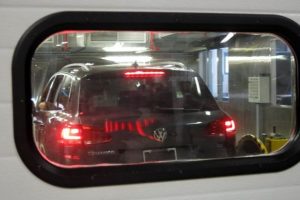by Jon LeSage, editor and publisher, Green Auto Market
Here’s my take on the eight most significant and interesting occurrences during the past week…….
 EPA testing: The U.S. Environmental Protection Agency will be expanding on-roads emissions tests for all diesel vehicles. The EPA practice had been to test only a handful of new vehicle each year to confirm laboratory results. Its first tests have recently included diesel vehicles from other Volkswagen Group brands, which found that about 10,000 VW, Audi, and Porsche vehicles using a 3.0-liter diesel V-6 also had illegal software. European regulators also plan to add on-road testing, although for somewhat different purposes than their U.S. counterparts.
EPA testing: The U.S. Environmental Protection Agency will be expanding on-roads emissions tests for all diesel vehicles. The EPA practice had been to test only a handful of new vehicle each year to confirm laboratory results. Its first tests have recently included diesel vehicles from other Volkswagen Group brands, which found that about 10,000 VW, Audi, and Porsche vehicles using a 3.0-liter diesel V-6 also had illegal software. European regulators also plan to add on-road testing, although for somewhat different purposes than their U.S. counterparts.- Hyundai plug-in hybrid: The 2016 Sonata Plug-in Hybrid is the first plug-in hybrid electric vehicle launched by Hyundai and comes with a 27 mile All-Electric Range (AER). “The flexibility of this alternative powertrain delivers efficient hybrid operation and eliminates any concerns for range anxiety, while providing an impressive total driving range capable of 600 miles,” said Mike O’Brien, vice president, corporate and product planning, Hyundai Motor America. The Sonata Plug-in Hybrid’s 9.8 kWh lithium polymer battery system helps deliver 99 MPGe.
- Best mpg pickup: The 2016 Chevrolet Colorado two-wheel drive with the Duramax turbo-diesel is the most fuel-efficient pickup in the U.S. with an Environmental Protection Agency-estimated 31 mpg highway fuel economy. The EPA-estimated highway fuel economy for 2016 Colorado four-wheel drive diesel is 29 mpg. With the Colorado’s 21-gallon fuel tank, the 2WD model offers an estimated maximum highway range of 651 miles per tank.
- EcoBoost benchmark: Ford launched its EcoBoost fuel-efficient engines in 2007 and is getting close to selling one million vehicles with these downsized, gasoline turbocharged, direct-injected (GTDI) engines. Currently every Lincoln-brand vehicle and every Ford from the Fiesta through the F-150 has at least one EcoBoost engine available as either standard equipment or an option. EcoBoost has been part of Ford hitting its fuel economy targets along with hybrid and plug-in vehicles.
- Fuel cell alliances: Audi may be getting into the hydrogen fuel cell vehicle business, and has acquired a number of patents on fuel cell technology from Canadian company Ballard Power Systems, a developer of fuel cells. Ballard has an agreement with Audi, with the two working together through 2019. Ballard thinks that the patents will help Audi develop a fuel cell vehicle that will be ready for the commercial market at some point in the future. In another alliance, 3M will support Plug Power’s expansion into hydrogen-enabled electric vehicle applications outside of the material handling market. 3M will supply Plug Power with membrane electrode assemblies to be used in Plug Power designed proton exchange membrane fuel cell stacks under a new strategic supply agreement.
- Recycled seat material: Carol Kordich, Ford lead designer, global sustainability materials strategy development, accepted the Society of Plastics Engineers’ Automotive Innovation Award in the Environmental category. Kordich was recognized for her work to replace traditional seat fabric with one made of 100% recycled material. Kordich’s effort helps to divert more than 11 million water bottles from landfills annually.
- Port of LA SCIG court hearings: On Nov. 16-17, California Superior Court Judge Barry Goode will listen to attorneys representing environmental organizations, community members, and regulatory agencies. Several parties have filed suit and will be heard by the court over two days over the planned Southern California International Gateway (SCIG) railyard. This plan was first announced in 2005 for a train path adjacent to West Long Beach. The Port of Los Angeles and Burlington Northern Santa Fe have committed to allow the Port to handle more cargo and reduce air pollution. Those filing suit have said that the SCIG will make air pollution worse, especially for the low-income, disadvantaged communities.
- Ford begins Mcity testing: Ford will become the first automaker to test out the 32-acre Mcity facility at the University of Michigan. Ford has been testing autonomous vehicle technologies for more than 10 years, and will expand testing of its Fusion Hybrid Autonomous Research vehicle. The research project combines driver-assist technologies, such as front-facing cameras, radar and ultrasonic sensors, with four LiDAR sensors to produce a real-time 3D map of the vehicle’s surrounding environment.



